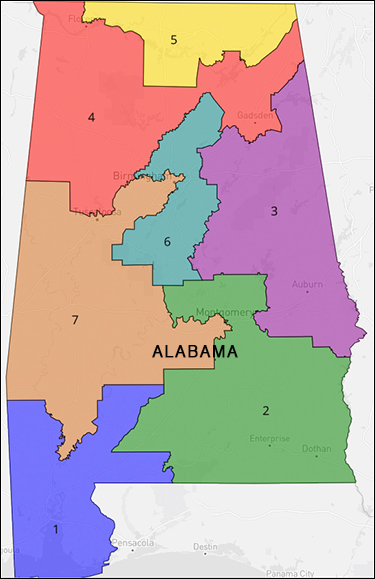By Jim Ellis — Wednesday, Oct. 4, 2023
House
Five States Affected: Democrats Have Upper Hand — Today we conclude our two-part series on the current status of Round II redistricting. We now examine the affected states from North Carolina through Wisconsin.• North Carolina: In what looks to be a strong new redistricting run for the Democrats in most of the other states, the North Carolina situation will mitigate some of the national Republican losses. North Carolina redistricting had been a virtual omnipresent issue throughout the previous decade, since we saw a new congressional map created in almost every election cycle.
The problem was largely politics. The state legislature alone controls redistricting (the North Carolina governor has no veto power over redistricting legislation), and the majority consistently held a different view of how districts should be drawn than did the Democratic state Supreme Court.
In the 2022 election, Republicans gained two seats on the seven-member judicial panel, thus turning a 4-3 deficit into a 5-2 majority. Now, seeing the legislature and judiciary largely on the same page as it relates to redistricting, it is very likely that the map legislators will draw in the next week or so will obtain the needed judicial approval. If so, such will be the final congressional redistricting map until the 2030 census.
It also appears that the legislature will return to the basic model that the Democratic Supreme Court failed to approve. Therefore, we can expect the current 7R-7D delegation map to probably end with 10 districts favoring Republicans and four trending Democratic.
Thus, Reps. Kathy Manning (D-Greensboro), Wiley Nickel (D-Cary), and Jeff Jackson (D-Charlotte) each could find themselves without a winnable district. Gaining three Republican seats in North Carolina would go a long way toward keeping the GOP in position to hold their slim US House majority.
• South Carolina: Soon after the first of this year, a federal three-judge panel declared the state’s Charleston anchored 1st Congressional District (Rep. Nancy Mace-R) to be an illegal racial gerrymander. This means the map drawers will likely add to the 1st African Americans from Rep. Jim Clyburn’s (D-Columbia) adjacent 6th District. This would make Rep. Mace more vulnerable to a Democratic candidate.
Nothing, however, has happened since the ruling, and it is unclear when the legislature will address the issue. Some movement is expected before the next election, but chances are strong that the legal challenges are not over.
Therefore, the Republicans may be able to delay long enough to push the final judicial decision, after the inevitable appeals are filed against whatever new map version is developed, until after the 2024 general election.
• Tennessee: A lawsuit claiming the new central Tennessee 5th Congressional District (Rep. Andy Ogles-R) is a partisan gerrymander is filed, but no judicial action has yet occurred. Even if the lower court rules in the plaintiffs’ favor, an appeal to the state Supreme Court will likely require more time than remains in the 2024 election cycle. Therefore, any change in the Tennessee map most likely will not happen until the 2026 election cycle.
• Texas: As in Tennessee, a lawsuit challenging the Texas map as a partisan gerrymander has been filed without seeing any judicial action. In this situation, regardless of how a lower court may rule, the Texas state Supreme Court would almost assuredly become involved. Therefore, it is probable that we will not see any substantive action changing the Texas congressional map in the 2024 election cycle.
• Wisconsin: The 6R-2D congressional map became a key point in the campaign to elect a new state Supreme Court Justice. Democrat Janet Protasiewicz won a seat on the high court, and her presence now gives her party a majority. She campaigned on what she sees as a Republican gerrymandered congressional map. The GOP filed a motion saying that she should be recused from hearing the 2023 redistricting because her stated campaign positions against the map demonstrates a preconceived bias. Predictably, the Supreme Court rejected the motion.
If the Democrats can get a map to the state Supreme Court, the result will almost assuredly be adverse for Republicans. The two most affected members will be those representing districts in the southern part of the state, Reps. Bryan Steil (R-Janesville) and Derrick Van Orden (R-Prairie du Chien/La Crosse).
One Democrat who may not be in favor of drawing a new map, however, is Sen. Tammy Baldwin. Currently, she is not being seriously challenged for re-election, but if a new map forces either Steil or Van Orden out of their districts, at least one would likely jump into the Senate race.
Chances are fair to good that the Democrats can force a new map to be drawn. The state has a late primary – August 13, 2024 – so time remains for a new redistricting plan to be enacted. If so, then count on seeing either Rep. Steil or Van Orden, or both, being displaced. This will likely mean one of the two enters the Senate race to challenge Baldwin. Though the GOP would sustain a US House loss, redistricting could ironically put the Wisconsin US Senate seat into play.






